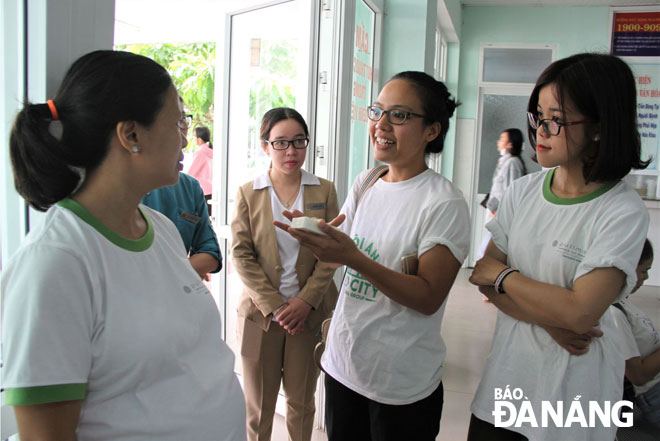Useful things made from trash
Ms Vo My Hanh, Director of the An Nhien Farm based in Quang Nam Province’s Hoi An City, has become actively involved in turning good-quality discarded soap bars and linens from luxury hotels and resorts into useful items for those in needed.
 |
| Ms Vo My Hanh, Director of the An Nhien Farm based in Quang Nam Province’s Hoi An City (2nd right) introducing her guests to the process of producing recycled soap. |
According to Ms Hanh, every month, luxury hotels in Da Nang and the province’s Hoi An City throw a large amount of cloths such as towels and blankets, and discarded bars of soap, after a certain period of using.
If they are not reused, these bars of soap will be released into the environment, soaking into soil and water sources.
Meanwhile, most old fabrics in high-end hotels are still good after they are replaced with new ones.
Therefore, Ms Hanh has taken the initiative to contact hotels’ owners to collect disposable soap bars, as well as towels and white cloths, for the purpose of recycling them into useful products which will then be donated to those in need.
In particular, recycling programmes namely ‘Soap for Hope’ and ‘Linens for Life’ were launched in central Viet Nam in July and September 2018 respectively to promote the environmental protection.
Accordingly, disposable soap bars which are collected from hotels and resorts have their surface cleaned by a machine to remove an outer layer. Once surface cleaning is complete, the soap is mixed with a sterilisation solution. Sterilized soap is then sent through a grinder in mass quantities. Finally, ground soap is then pressed to form new bars that are ready to use.
Meanwhile, waste cloths are washed in the hygiene process and then transported to sewing establishments to recycle into new bags, school uniforms, wiping cloths and bed sheets.
Recently, a total of 50 soap bars and around 400 medical fabric products such as bed sheets, tablecloths and oxygen-covered towels have been given to the Thanh Khe District Medical Centre.
Dr Phan Thanh Phuong, the Centre’s Director, said that the donated products are qualified for using in normal medical activities.
In addition to reducing waste released to the environment, the recycling programmes have helped to create jobs for disabled women in Da Nang.
According to Ms Mai Dung, the Director of the Centre of Study and Community Inclusive Support (Cormis), since late 2018, her centre has cooperated with the An Nhien Farm to implement the ‘Linens for Life’ recycling programme.
The intention of the programme was to reduce waste to the environment and create job opportunities for local women with disabilities.
Currently, the Cormis Centre has 6 disabled workers. 4 of them often go to the Centre for working, and the remaining 2 severely-disabled people work at home.
Mrs Ngo Thi Hong, 50, residing in Son Tra District’s Phuoc My Ward is one of the disabled people who are working at the Centre.
Apart from her stable income from sewing clothes at home, Mrs Hong has earned extra income from doing job at the Center to improve her living standards.